
Welcome to the April WSU Sustainability Newsletter!
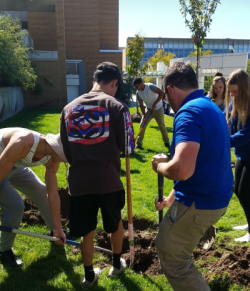 Annual Spring Tree Planting!
Annual Spring Tree Planting!
The annual Spring Tree Planting will take place on April 18th, 2018, at 1:30 p.m. Environmental Ambassadors will plant about eight trees near Wildcat Village and the W7 parking lot. Several students from the local K-12 schools will come to help. WSU Landscaping will pick the trees from a local nursery based on 3 main criteria: 1. Trees whose soil needs match that of the planting area (i.e., species that are highly tolerant to salt). 2. Diversifying tree species on campus. 3. The area’s aesthetic requirements (i.e., the trees’ height, width and flowering capacity).
RSVP at https://doodle.com/poll/uiax3qrk6zwaadfd for a food count!
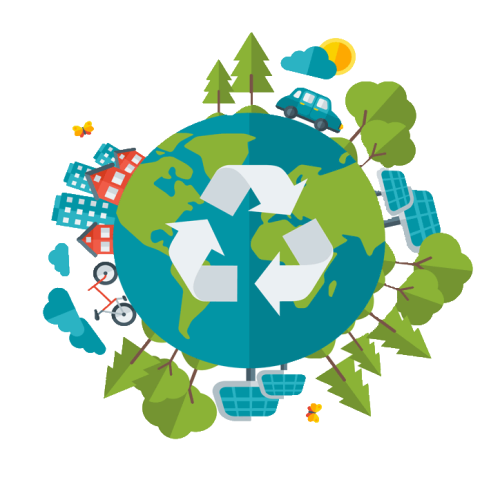 WSU Helps Cut Pollution to Celebrate Earth Day
WSU Helps Cut Pollution to Celebrate Earth Day
Weber State Today's Earth Day press release provides an excellent summary of sustainability efforts on campus! It includes the planned arrival of our first electric campus shuttle bus, sustainability in the curriculum and in operations, community programs, and recent awards related to sustainability. Earth Day may be April 22nd, but here at WSU, we strive to celebrate it each day!
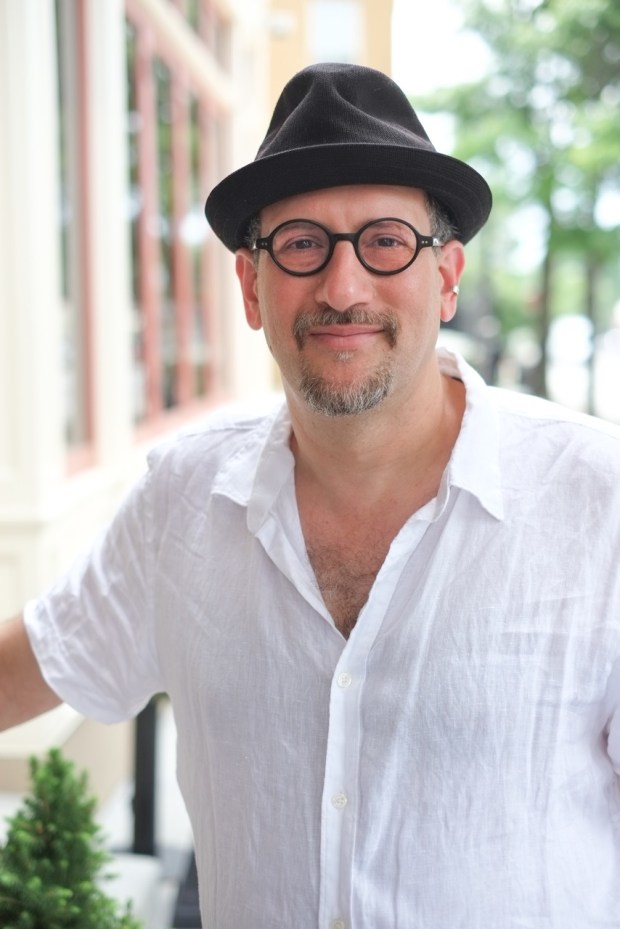 David Grinspoon: Earth in Human Hands
David Grinspoon: Earth in Human Hands
Please join the Department of Physics in welcoming David Grinspoon to discuss his latest book, Earth in Human Hands, on April 21st, 7-9 p.m. This talk is open to the public at the Ogden Campus, Hurst Center, Dumke Hall.
David Grinspoon is an astrobiologist, award-winning science communicator and prize-winning author. He is a senior scientist at the Planetary Science Institute and adjunct professor of astrophysical and planetary science at the University of Colorado. His research focuses on climate evolution on Earth-like planets and potential conditions for life elsewhere in the universe. He is involved with several interplanetary spacecraft missions for NASA, the European Space Agency and the Japanese Space Agency. In 2013 he was appointed as the inaugural Chair of Astrobiology at the U.S. Library of Congress, where he studied the human impact on Earth systems and organized a public symposium, the Longevity of Human Civilization. His technical papers have been published in Nature, Science and numerous other journals, and he has given invited keynote talks at conferences around the world.
Without minimizing the challenges of the next century, Grinspoon suggests in his book that our present moment is not only one of peril, but also of great potential, especially when viewed from a 10,000-year perspective. Our species has surmounted the threat of extinction before, thanks to our innate ingenuity and ability to adapt, and there's every reason to believe we can do so again.
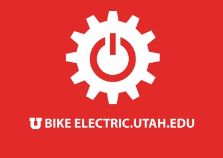 Interested in an Electric Bike?
Interested in an Electric Bike?
Local Ogden business Bingham Cyclery is partner in an electric bike purchase program running from March 26 to May 26.
As they note, "We are excited to partner with the University of Utah and Utah Clean Energy for the U Bike Electirc Program. Students, staff, alumni (or anybody who has visited the University of Utah) can enroll in the program to receive a discount on our e-bikes + a complimentary two-year service plan."
See https://utahev.org/about-u
 Student/Faculty Research Awards
Student/Faculty Research Awards
We are pleased to announce the two faculty members and six students (working on two student projects) who received awards for their sustainability research in either traditional or applied scholarship. The winners, with the title and descriptions of their work, are below.
Faculty Sustainability Award - Traditional Scholarship
"Thermal Wave Propagation in Packed Beds of Encapsulated Phase-Change Materials" by Glen West, associate professor in Design Engineering Technology
"The objective of this research is to explore the practicality of storing and retrieving thermal energy in and from packed beds where heat transfer occurs among the working fluid, the bed and the surroundings. Enhanced thermal energy storage methods are key to improving the coefficient of performance for refrigeration systems used in air conditioning applications. Advances in thermal energy storage systems may also supplement agricultural production in greenhouse applications. This project was designed to explore opportunities for harvesting and reusing thermal energy from processes that otherwise eject waste heat to the atmosphere. Thermal energy storage could support moderate load requirements in air conditioning systems as well as extend growing seasons in agricultural production applications."
Faculty Sustainability Award - Applied Scholarship
"Design, Construct, and Analyze Net Zero Ready Home for Local Weber/Davis Habitat for Humanity Affiliate,"
by Jeremy Farner, associate professor in Design Engineering Technology.
“My students and I have been working to help the local Habitat for Humanity affiliate build high performance homes with a lower true cost of ownership. This multi-year project is in the second phase of running energy analysis on the last two homes we completed. We designed these homes using advanced framing techniques to maximize insulation, at the same time reducing the amount of lumber used by 10% or more. We implemented passive solar design techniques to take advantage of the sun during the winter months to offset some of the heating load; shading windows in the summer months offsets some of the cooling load. We implemented Building America Best practices, which continuously insulates the exterior to remove the thermal bridging through the studs as well as better air seal the homes. The results are that we are seeing significantly lower energy bills. But this is not enough for us. We are in the design stage of our next two homes and are looking to go all electric to better prepare our homes to be truly "Net Zero" if the homeowners choose to install a small solar array. We are running pre-construction energy analysis and are getting favorable results that we hope will translate to even lower energy bills and thus lower the cost of ownership for deserving families who are selected as recipients of these homes. Partnering with Habitat for Humanity has opened up doors for WSU students to design, estimate, schedule, run energy analysis, and construct homes in the "real world." This partnership is invaluable for the students who get to participate in learning opportunities, and at the same time give back to their community."
Student Sustainability Research Award
“Water Basin Water Conservancy District/Weber State University pricing Elasticity Study,” by Alison Smith and Alberta Young, working with Gary Johnson (political science).
This research was a collaborative effort between Weber State University students in Dr. Johnson's Urban Government Course in Spring 2017 and the Weber Basin Water Conservancy District. The project was initiated by Utah’s unique and difficult policy challenges associated with a very fast growing, arid, western state whose water pricing system is inconsistent with population trends and consumer pricing. We began the process by identifying 15 cities served by the Weber Basin Water Conservancy District. By comparing these 15 cities with other cities in the area we have established a pricing structure that is relative to other structures. Incentives include saving time, money and, most importantly, water.
“Effects of Xeriscaping on Surface Temperatures,” by Hailey Burton, Heather Couturier, Kyia Hill, Emily Kaemmer, working with Dan Bedford (geography).
“As Weber State moves towards serious water conservation efforts, questions remain about how best to implement water-efficient landscaping, or xeriscaping, and what surfaces to use. This project measured temperature differences for road, grass, dark wood chips, and rocks, and found that dark wood chips—currently a top pick for use in campus xeriscaping—gets incredibly hot in the sun. In light of these findings, WSU grounds staff may be reassessing the choices for xeriscaping.”
Keely Lange, 2018 NEWH Sustainable Design Scholarship Winner

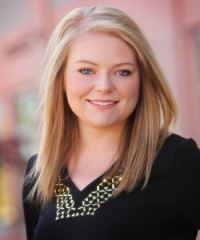
Keely Lange, senior at Weber State, was recently awarded the national 2018 NEWH Sustainable Design scholarship for her building project “Hotel Carver." Initially, Keely had to submit her project through her interior design course. The competition could only accept 5 submissions from a professor and these were carefully selected by the Sustainability Office. The interior of the building had to meet LEED building requirements and utilize technology and topics of sustainability, such as site selection, water efficiency, and energy conservation. The project would be judged on its professional look and appeal as well as how the occupants could use the space in an environmentally conscious way. Each building material, such as the carpets, walls, windows, and paint had to be determined whether it would contribute to the overall green goal of the project.
Keely was inspired by the famous Wynwood Walls project in Miami, Florida. This previously fading town had been transformed like Cinderella, as artists were invited to come and literally paint the town. Each space in Hotel Carver would feature a different art piece from Wynwood as the focal point of the room. The hotel lobby wall would showcase her favorite piece, a striking mural made with 100% recyclable aluminum. It an amazing experience for Keely to see her project create a welding link between the vibrant culture of the area and sustainability.
“I fell in love with this project, and because of that I made sure each idea was articulated the way I wanted it to be and to showcase how sustainability and LEED points could come together in a unique way. I think people saw the heart that I put into it and it resonated with them.”
She hopes that this opportunity will demonstrate the how useful interior design can impact code and increase demand for sustainable materials, and ultimately bring more color to the career as a whole.
 Wild Wednesday and Earth Day Fair at the Ogden Nature Center
Wild Wednesday and Earth Day Fair at the Ogden Nature Center
The Ogden Nature Center is holding two Earth Day events. Join with others on Wild Wednesday, April 18, to explore cool facts about planet Earth. How much do you know about our watery planet? Learn ways to do your part and help the planet and enjoy a nature walk and trash pick-up around the Nature Center. On Saturday April 21 from 11 a.m. to 4 p.m. is their annual Earth Day Fair. Visit their website for costs and details: http://www.ogdennaturecenter.
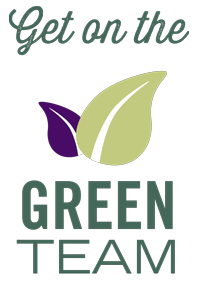 Congratulations to Green Certified Departments!
Congratulations to Green Certified Departments!
The Energy & Sustainability Office is proud to announce that the following departments have recently achieved certification (since November 2017):
Gold
Geosciences
Office of Vice President for Student Affairs
Silver
Nursing
Bronze
Division of Online and Continuing Education: Hurst Center 101
Housing & Residence Life
Sodexo
New Green Teams
Student Success Center
Office of Sponsored Projects
Teaching Learning Forum
Please congratulate your colleagues on their green achievements and welcome our new green teams!
Get on the Green Team
If you are interested in getting your office or department involved in the Green Certification Program, please contact Kayla Hickman at kaylahickman@weber.edu or visit https://www.weber.edu/sustainability/GreenDept.html. The purpose of the Green Department Program is to engage WSU offices and departments in the work of making the entire university more sustainable and carbon neutral. The program is voluntary and competitive. Participating departments assemble a green team and acquire points through sustainable practices. The number of points achieved determines certification at the bronze, silver, gold, or green levels.
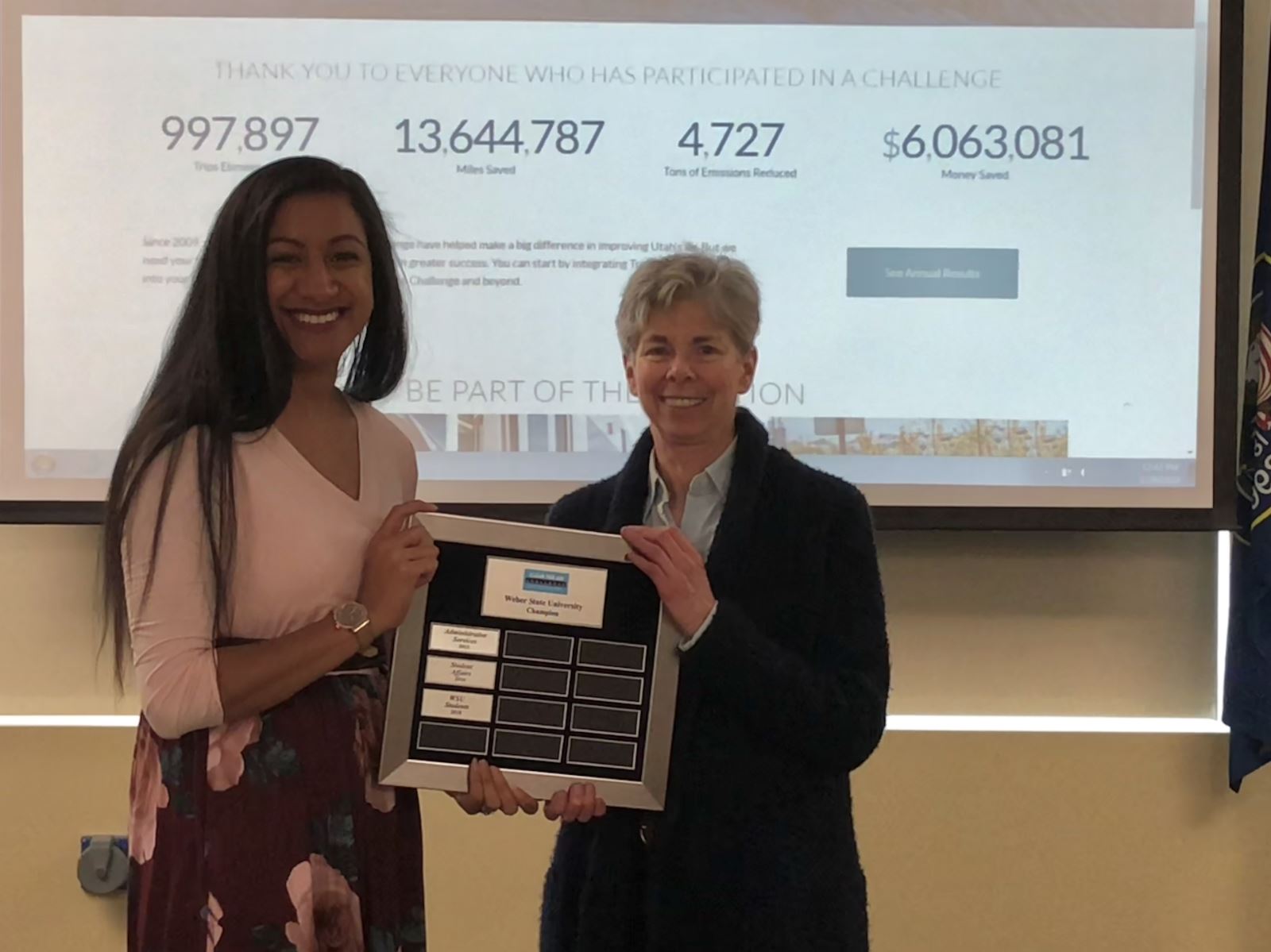 Clear the Air Challenge Results
Clear the Air Challenge Results
By taking alternative modes of transit, Weber State University students, faculty, and staff traveled over 32,000 miles and saved over 8.9 tons of CO2 from polluting our air during the February 2018 state-wide Clear the Air Chall
Thank you to all who participated in this challenge to clean our air.
Mow Electric
.png)
Did you know running a gas-powered lawn mower for one hour is equal to driving a car 160 miles? Weber State University’s sustainability offices, in partnership with the Weber-Morgan and Davis County Health departments, Utah Department of Environmental Quality, and the Utah Clean Air Partnership are hosting “Cut Pollution – Mow Electric” to promote cleaner air and healthier lives in Utah.
The Cut Pollution - Mow Electric program is providing 836 residents with an electric mower in exchange for their old gas-powered mower on Saturday, April 21.
Over 1,600 submissions were received to participate in the program. Residents were selected via a randomized lottery to be a part of the exchange. Winners were selected from areas that regularly experience poor air quality as determined by the Environmental Protection Agency, and included households from Provo to Logan.
Electric mowers are cheaper, quieter, and cleaner than traditional gas-powered mowers. Going electric means the air is cleaner for the person doing the work, as well as for the wider community.
